EN
2022-08-08
Source: People's Daily Health APP
On August 6, the "Innovative Drug Clinical Study Summit Forum", part of the 2022 Shanghai International Biopharmaceutical Industry Week Series of Events, was opened. Several guests shared at the forum, pointing out that China's pharmaceutical innovation is still on its way. Currently, the number of clinical studies in our country has increased significantly, but capabilities still need to be improved.
China's Cancer Treatment and Innovative Clinical Research Still Have a Significant Gap Compared to Europe and the United States
According to the latest "Global Cancer Statistics 2020" released by the International Agency for Research on Cancer of the World Health Organization, in 2020, there were 19.29 million new cancer cases worldwide and 9.96 million deaths. Among them, China had 4.57 million new cancer cases and 3 million deaths.
"According to recent data released by the United States, the overall five-year survival rate for cancer patients in the U.S. is 72%, which is very high, while in China this rate is less than 40%. In terms of cancer treatment, China still has a large gap compared to Europe and the United States," pointed out Professor Jun Ma, Director of the Harbin Institute of Hematology and Oncology Research, during his presentation.
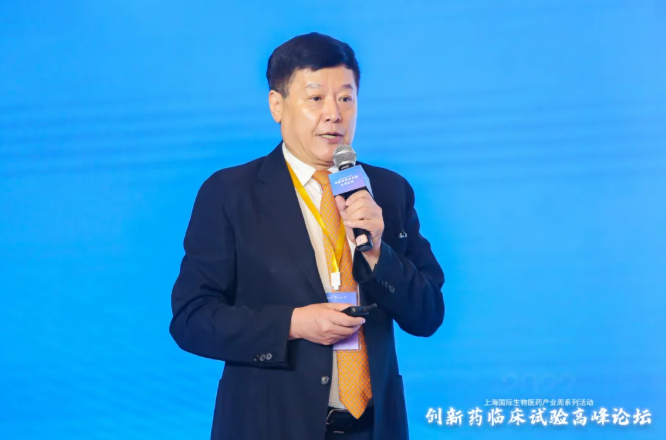
Professor Jun Ma, Director of the Harbin Institute of Hematology and Oncology Research, at the Innovative Drug Clinical Study Summit Forum (Photo)
In May 2017, the former State Food and Drug Administration released the "Related Policies on Encouraging Drug and Medical Device Innovation and Reforming Clinical Study Management" (Draft for Comments) in which the qualification approval of clinical study institutions was changed to a record-filing management system.
In July 2018, the National Medical Products Administration issued the "Announcement on Adjusting the Review and Approval Procedure for Drug Clinical Trials" which made adjustments to issues related to the review and approval of drug clinical studies, i.e.: For drug clinical study applications submitted in our country, if the applicant has not received any negative or questioning opinions from the Center for Drug Evaluation of the State Food and Drug Administration within 60 days from the date of application acceptance and payment, they may conduct the drug clinical study according to the submitted protocol.
According to data from the drug clinical trial institution filing management information platform, as of November 19, 2021, there are a total of 1,165 drug clinical study institutions in China, of which 1,117 are in filed status, and 48 drug clinical study institutions have their filing status canceled.
"After our policy reforms, the number of clinical study institutions has grown significantly, but about half of these institutions have never conducted clinical studies. Institutions capable of conducting 30 clinical studies in a year do not exceed 30%, and those able to conduct international multi-center clinical studies are even rarer," pointed out by Professor Ruilin Song, President of the China Pharmaceutical Innovation and Research Development Association.
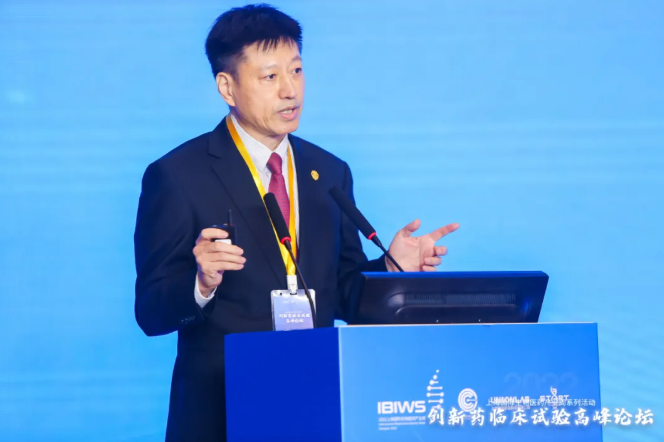
Professor Jin Li, Director of the Oncology Department, Tongji University East Hospital, at the Innovative Drug Clinical Study Summit Forum (Photo)
Professor Jin Li, Director of the Oncology Department, Tongji University East Hospital, also stated that a very important "bottleneck" affecting the development of innovative drugs in China today is clinical studies. "At present, our country's ability to design innovative clinical research is insufficient, and we lack first-class clinical research teams. There is still a significant gap compared with advanced countries."
The Key to Innovation in Clinical Studies Lies in Differentiation
In the afternoon's roundtable interaction and expert dialogue session, Dr. Yanshan Huang, founder of Doer Biologics, shared his understanding of the development of differentiated innovative clinical studies: "The differentiation of the product itself largely determines the differentiation of the clinical study. How to further strengthen product differentiation through clinical studies is also very important, and this is what we have been exploring and practicing."
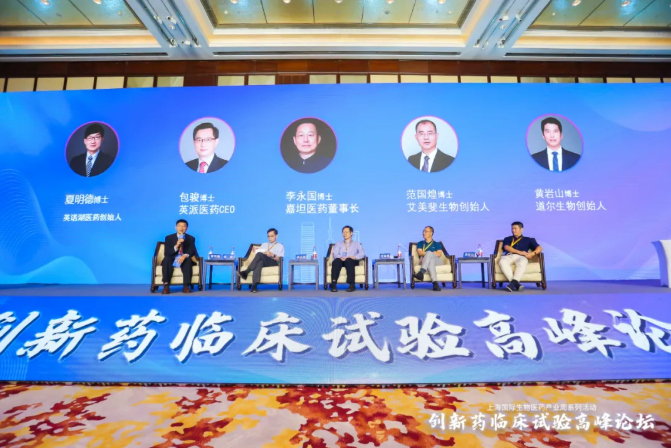
Roundtable Interaction Session - Innovative Drug Clinical Study Summit Forum (Photo)
Dr. Yongguo Li, Chairman of Jiatan Pharma, considered that developing drugs is about giving the right medicine to the right patient and using the right dose at the right time to cure the patient's illness. Therefore, the initial clinical study design should consider how to achieve this effect, and when you ponder over this issue enough, differentiation naturally emerges.
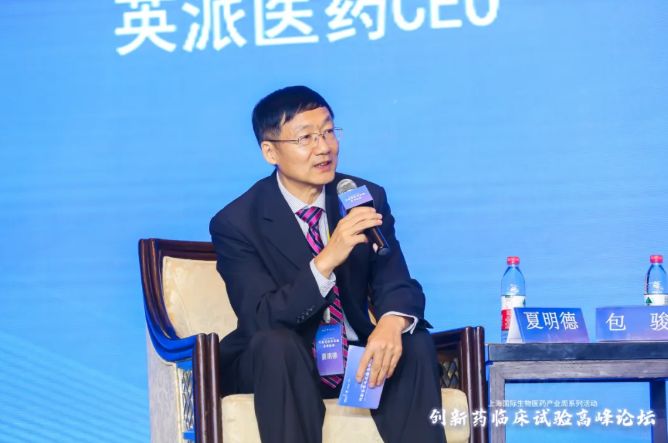
Dr. Mingde Xia, Founder of Innolake Biopharma, at the Innovative Drug Clinical Study Summit Forum (Photo)
Dr. Mingde Xia, founder of Innolake Biopharma, pointed out that there are currently many companies engaged in drug R&D in China, and the competition is unprecedented. In such an environment of "involution of the same targets," a key issue for Chinese companies aiming to enhance their competitiveness and "go global" is to achieve differentiation. Our strategy for differentiated innovation at Innohull Pharma is "all-around innovation": target innovation, innovation in R&D techniques, clinical development innovation, innovation in business expansion methods, etc.
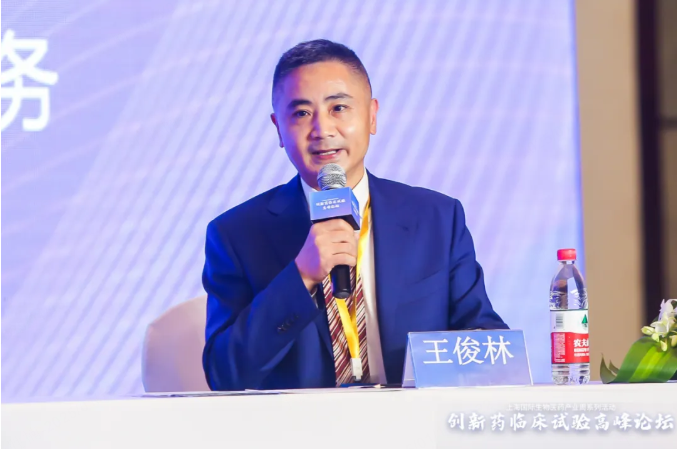
Junlin Wang, Founder of UnionClin, at the Innovative Drug Clinical Study Summit Forum (Photo)
As a third-party service enterprise focusing on clinical studies in the field of oncology, the founder of UnionClin, Junlin Wang, said in an interview with the People's Daily Health APP that truly innovating drugs requires creating differentiation. The early clinical stages of new drugs are particularly important. Continuous attempts must be made to find a viable path. This is a dynamic process of trial and error, which requires a deep understanding of processes, systems, expertise, and service modules, and achieving mutual coordination. This is precisely the specialty and strength of UnionClin.
"China's clinical studies must proceed, and we have two major advantages: first, we have our patient resources; second, we have the execution capabilities of the Chinese people," said Dr. Weiwen Ying, founder of Ranok, in his speech.
Adopt Multiple Approaches, Rely on Innovation and Talent to Promote High-Quality Development of Clinical Studies
How can we promote the high-quality, efficient, and sustainable development of China's clinical studies in the future?
Professor Shukui Qin, Vice Chairman of the East Clinical Center for Oncology, pointed out that for pharmaceutical companies as sponsors, special attention must be paid to being patient-centered and clinically value-oriented in clinical studies. This is not an empty slogan; it is a principle that must be adhered to regardless of scientific or commercial interests. This principle must be reflected throughout the design and execution of clinical studies and cannot be compromised or ignored by commercial interests. The interests of patients, as well as the efficacy, safety, and tolerability of the drugs, will directly determine the prospects of the medication. For clinical study institutions, quality must be the top priority. If one blindly pursues quantity while neglecting quality, it will inevitably lead to significant problems in the long run.
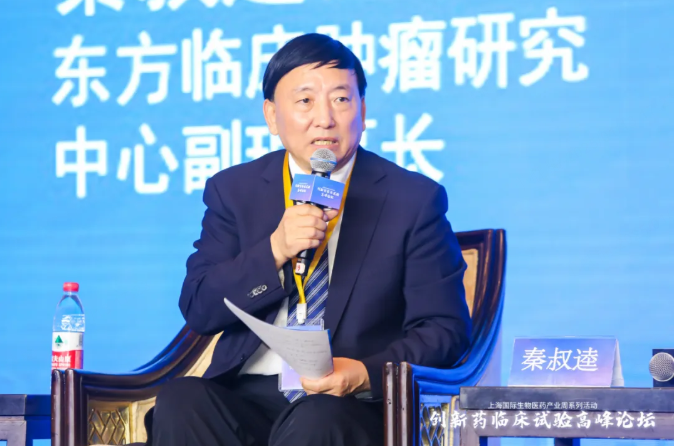
Professor Shukui Qin, Deputy Director of East Clinical Center for Oncology, at the Innovative Drug Clinical Study Summit Forum (Photo)
Regarding how to promote the positive development of clinical study work, Professor Jin Li stated that, on the one hand, he calls for more policies to be introduced to promote new drug creation and the construction of clinical research centers; on the other hand, hospital administration must place greater emphasis on clinical studies. In addition, clinical practitioners should also contribute their efforts, and he said: "Our hospital has already built a fully intelligent clinical study platform, introducing artificial intelligence into clinical studies, which not only improves work efficiency but can also greatly reduce the costs of clinical research."
"Rather than 'overtaking on a curve', our country's clinical study work needs to 'change lanes to overtake'—we must have solid strength. Only by relying on innovative talent and innovation capabilities can we achieve high-quality development in the field of clinical studies and proceed steadily and further," said Academician Jinming Yu, President of Shandong Cancer Hospital.